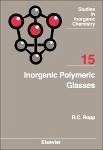The book elucidates the technical details required to produce such molecularly-polymerized glasses from carefully prepared inorganic molecular monomers. Essentially, only silicate-based glasses have been known to be stable, whereas non-silicate glasses could not be attributed with such properties. Such glasses have, therefore, not found widespread usage in industry. The new phosphate glasses described here exhibit stabilities superior to many of the silicate glasses. For example, the nuclear-waste glass shows no measurable loss at all in boiling water, something entirely foreign to the zinc borosilicate glasses developed for nuclear waste encapsulation in the U.S. by Battelle-Northwest.
The exceptional stability of the new glasses is achieved by selecting an inorganic compound capable of being polymerized, and then causing it to polymerize in a proper manner, in the absence of chain-stoppers. To obtain glasses equal or superior in hydrolysis stability to silicate-based systems it is imperative to employ molecular polymerization in situ, starting from carefully prepared precursors of exact stoichiometric proportion.
Researchers in glass and glass properties will find this volume extremely useful and those involved in organic polymers will be intrigued by the similarities and disparities of the two systems.
Dieser Download kann aus rechtlichen Gründen nur mit Rechnungsadresse in A, B, BG, CY, CZ, D, DK, EW, E, FIN, F, GR, HR, H, IRL, I, LT, L, LR, M, NL, PL, P, R, S, SLO, SK ausgeliefert werden.









